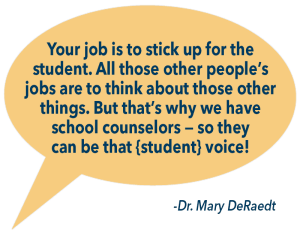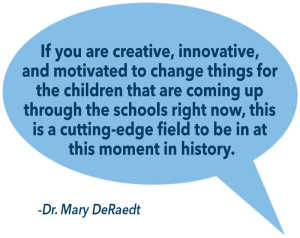More and more, there has been a movement toward a whole child approach in K-12 education — meaning, focusing on students’ social-emotional learning, growth, and development in addition to their academic performance. Entire school curricula are shifting to incorporate these core competencies, helping students become well-rounded, resilient, and responsible members of our community. The support of school counselors is key for classroom teachers and district administrators to achieve these goals.
School counselors provide counseling, assessment, consultation, and guidance services, designed to create an equitable and accessible world in which all students thrive, regardless of background or circumstance. They work in tandem with teachers and administrators to implement behavioral intervention systems, address social-emotional challenges, and improve access to opportunity and achievement. In short, school counselors are important partners in empowering adolescents to become successful civic citizens.
If you’re passionate about working with students but less so about standing in front of a classroom, a school counseling career may be the right path for you. If you’re currently a teacher thinking about making the move to counseling, consider whether you’re prepared to leave behind the concreteness of teaching and embrace the ambiguity of counseling.
Above all, school counselors are student advocates.
For many school counselors, a standard approach is, “What’s in this student’s best interest?” However, this can often be challenging when parents, administrators, and curriculum standards are advocating for something else. Dr. Mary DeRaedt, an assistant professor at the Graduate School of Education and Human Development at the George Washington University shares, “It’s easy to get caught up in all of that and miss the purpose of you as a school counselor who is uniquely there to be a voice for that student. Your job is to stick up for the student. All those other people’s jobs are to think about those other things. But that’s why we have school counselors — so they can be that voice!”
Inherently, school counseling is based on a social justice framework, as there’s no such thing as a one-size-fits-all approach to what will yield positive results for a student. Understanding what barriers or opportunities have been afforded to that student can help determine what they need most. Recognizing the role access and equity play in leading to a student’s overall success — and responding to that appropriately — is what often best empowers that same student to succeed.
So how does one go about becoming a school counselor?
A standard requirement for any career in school counseling is a master’s degree from an accredited university. While the standard is a degree in school counseling, there are other fields that are considered acceptable toward earning a state-issued credential. At the George Washington University’s Graduate School of Education and Human Development, our school counseling program includes classroom, laboratory, and field-site education and training in diverse academic environments. Our location in Washington, D.C. provides access to urban and suburban public, charter, and private schools, allowing our graduate students to examine, compare, and contrast schools with widely different student populations, structures, and demographics.
Students also benefit from a core class that complements their field experience by using it as a space to process the differences between the practices we teach in the classroom and the actual environments in which they are placed. Students can use that time to discuss the ambiguity between ideal and realistic and how to navigate between those two things, making them more prepared for life beyond training.
Once a school counseling master’s degree has been obtained, many students will go on to pursue counseling certifications, such as certified school counselor, a licensed professional counselor with a specialty in children and adolescents, and/or a registered play therapist. You can also choose a counseling specialty.
School counseling roles differ based on age groups and settings.
For example, a school counselor within elementary education may have a very different day-to-day than a school counselor in a high school setting. Elementary school counselors are often considered the “emotions teachers” because they help students understand and handle their emotions. In addition to teaching guidance lessons and social-emotional learning (SEL) within the classroom, they focus on the foundational skills students need to excel academically. They may partner with teachers and administrators to ensure the curriculum addresses students’ needs, while also working with parents or guardians to address developmental or behavioral issues on a one-to-one or small group basis.
In a middle school setting, students are often grappling with the increasingly grown-up problems that come with transitioning from childhood to young adulthood — not to mention their changing bodies. Middle school counselors help students learn how to manage relationships and understand their identities as they encounter more complex themes and experiences. Counselors can serve as an advocate, a listener, and a navigator, among many other things. They also can intervene should any academic or behavioral issues arise, helping to formulate a plan of action that sets both the students and teachers up for success.
High school counselors are more oriented toward academic and career plans, preparing students for life after graduation. They are also more attuned to the social and emotional climates facing students, complete with internal and external pressures such as drug abuse, bullying, mental health crises, and more. A recurring theme among high school counselors is helping students focus on who they are and who they want to become. Counseling is often provided on a one-to-one basis, rather than as a complement to classroom learning.
School counseling career opportunities abound.
According to the U.S. Department of Labor’s Bureau of Labor Statistics, “Employment of school and career counselors and advisors is projected to grow 10 percent from 2021 to 2031, faster than the average for all occupations.”
More than just expanding in growth opportunities, it’s also an extremely valuable position that is on the precipice of redefining its role in schools. Explains Dr. DeRaedt, “Post-pandemic, we have recognized the cracks in the system and people have leaked through those cracks — students, teachers, other counselors. So many people have left because those cracks were deeper than we thought. Right now, if you want to get in on a career where you have the potential to very quickly rise up to someone to change the focus of schools, the culture of schools, the policies of schools, being a school counselor puts you in a very unique position.”
There are also a variety of industries you can pursue with a school counseling degree: health and wellness centers, school districts, consulting, publishing, and more. At the end of the day, a school counseling degree prepares you to help youth navigate emotional regulation, emotional support, and psychoeducation. Explains Dr. DeRaedt, “If you are creative, innovative, and motivated to change things for the children that are coming up through the schools right now, this is a cutting-edge field to be in at this moment in history.”
If you’re interested in pursuing a school counseling master’s, consider a master’s degree in school counseling from the George Washington University. Our counseling graduate programs are cohort-based, enhancing the classroom learning experience while strengthening skills to assess, support, and engage with students, their families, and school leaders. With a school counseling degree in hand, you will be well-equipped to create a school culture of success for all.




